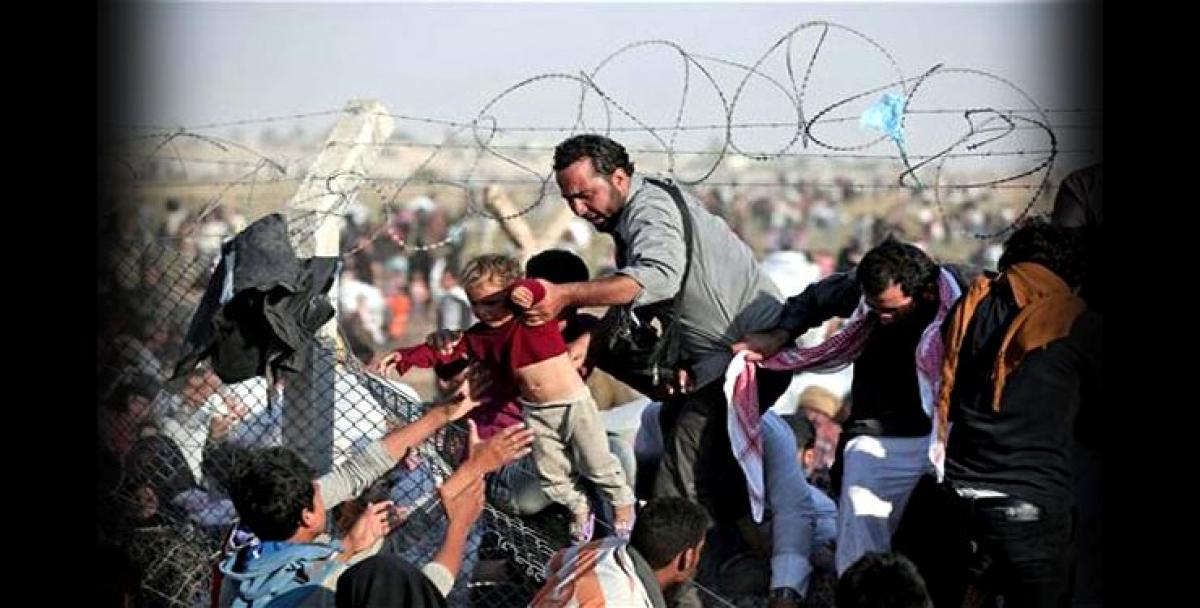Live
- G20 Leaders Will Talk About Climate, Taxes, and Trump's Return in Brazil
- COP29: CDRI announces $8 million funding for 12 projects to address climate crisis
- Anti-Telgu remarks: Actor Kasthuri Shankar moves court for bail
- Samsung AR Smart Glasses Set to Launch in 2025, Featuring Ray-Ban Meta-Like Design
- Kerala Industries Minister confident that new policy will boost plantation sector
- Madras HC plans inter-departmental monitoring committee to combat drug use in TN
- Bihar: Spotted deer dies due to heart attack in Banka district
- Mushtaq Ali T20: Shami to spearhead Bengal bowling attack, Gharami named captain
- Kharge's clarion call to oust Maharashtra's BJP-backed MahaYuti
- Why Ukraine’s Use of US Missiles Against Russia Could Lead to World War 3
Just In

x
Highlights
Austria on Wednesday announced plans to build a fence at a major border crossing with fellow EU state Slovenia to \"control\" the migrant influx, in a blow to the EU\'s cherished passport-free Schengen zone.
Vienna: Austria on Wednesday announced plans to build a fence at a major border crossing with fellow EU state Slovenia to "control" the migrant influx, in a blow to the EU's cherished passport-free Schengen zone.
Both countries have become key transit points for tens of thousands of refugees and migrants seeking to reach northern Europe ahead of the winter, and before more potential EU border closures.
.jpg) Vienna's announcement prompted sharp criticism from Berlin, underlining how the crisis is straining relations within the EU.
Vienna's announcement prompted sharp criticism from Berlin, underlining how the crisis is straining relations within the EU."We do not believe that the current migrant crisis that Europe is facing can be resolved with the building of fences or walls," German government spokesman Steffen Seibert said.
EU officials said they were not told in advance of Austria's plan and in a sign of the sensitivity of the development, European Commission President Jean-Claude Juncker held hastily-arranged phone talks with Austrian Chancellor Werner Faymann.
Afterwards the two men issued a statement apparently seeking to stress common ground amid the rift.
"The President and the Chancellor repeated their common position that fences have no place in Europe," the statement said.
Just days ago Juncker and other EU leaders at an emergency Balkans summit warned that "unilateral actions could trigger a chain reaction".
Slovenia -- another Schengen country -- also reiterated its readiness to erect a fence along its Croatian frontier if new EU plans aimed at improving the situation failed to produce quick results.
'Ensuring order'
The Schengen passport-free area is seen as one of the EU's most important achievements and the Commission has repeatedly expressed concern that re-imposing border controls threatens its future.
In a further blow, Germany announced it was extending border controls until November 13, and possibly for another three months after that.
Berlin brought back border controls in September to try check the overwhelming number of refugees entering the country, in what amounted to a de-facto suspension of its Schengen membership.
Austrian Interior Minister Johanna Mikl-Leitner insisted the proposed barrier was "not about shutting down the border".
"This is about ensuring an orderly, controlled entry into our country. Also, a fence has a gate," she said Wednesday.
More than 700,000 people have landed on Europe's southern shores so far this year, the majority from Syria, Iraq and Afghanistan, and divisions have opened up between EU states about how to deal with the crisis.
Nations along the migrant trail northwards from Greece have been overwhelmed, and Hungary -- an EU and Schengen member -- has sealed its southern borders with razor wire to stop the flow.
The human cost of the crisis rose again on Wednesday as at least seven people, including five children, died when four migrant boats sank off the Greek island of Lesbos.
More than 3,200 are estimated to have died in the Mediterranean since January.
'Fortress Europe'
Few details have been released so far about Austria's planned barrier, which is set to run several kilometres either side of the Spielfeld border crossing, where thousands of migrants have arrived in recent weeks.
Mikl-Leitner -- who last week said it was time to build "fortress Europe" -- pointed the finger at Germany, which is expecting up to one million asylum-seekers this year, saying border police there processed too few migrants and criticising Chancellor Angela Merkel's open-door policy.
German Interior Minister Thomas de Maiziere hit back, accusing Austrian border police of waving through thousands of migrants without properly informing local authorities.
At the Austrian-German border, diplomatic spats were low on the migrants' list of worries.
"In Syria, I left because of the bombs and now, here, it's like a prison. They tell us nothing, we know nothing," said one man named Walid.
"Yesterday, some people of my family could go but not me and my two daughters. The German police didn't explain why, and now my family is cut in two."
Germany is seeking to crack down on economic migrants, with tens of thousands of rejected asylum applicants from Balkan countries due to be sent home in the coming months.
De Maiziere has also urged Afghans to stay and rebuild their war-torn country instead of coming to Europe.
Further south, Slovenia has been struggling to cope with the influx -- nearly 90,000 have arrived in the last two weeks -- and warned it too would shut its border if the EU did not stick to a 17-point action plan announced at Sunday's Balkans summit.
The crisis has boosted the far-right and anti-immigration parties across Europe. Up to 5,000 anti-migrant protesters rallied across the Czech Republic on Wednesday.

Next Story
More Stories
ADVERTISEMENT
© 2024 Hyderabad Media House Limited/The Hans India. All rights reserved. Powered by hocalwire.com







